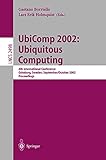UbiComp 2002: Ubiquitous Computing [electronic resource] : 4th International Conference, Göteborg, Sweden, September 29 - October 1, 2002. Proceedings /
Material type: TextSeries: Lecture Notes in Computer Science ; 2498Publisher: Berlin, Heidelberg : Springer Berlin Heidelberg : Imprint: Springer, 2002Edition: 1st ed. 2002Description: XVI, 388 p. online resourceContent type:
TextSeries: Lecture Notes in Computer Science ; 2498Publisher: Berlin, Heidelberg : Springer Berlin Heidelberg : Imprint: Springer, 2002Edition: 1st ed. 2002Description: XVI, 388 p. online resourceContent type: - text
- computer
- online resource
- 9783540458098
- User interfaces (Computer systems)
- Human-computer interaction
- Computer networks
- Computers, Special purpose
- Software engineering
- Operating systems (Computers)
- Application software
- User Interfaces and Human Computer Interaction
- Computer Communication Networks
- Special Purpose and Application-Based Systems
- Software Engineering
- Operating Systems
- Computer and Information Systems Applications
- 005.437 23
- 004.019 23
- QA76.9.U83
- QA76.9.H85
Mobile and Context-Aware Systems -- Context-Aware Computing: A Test Case -- ComicDiary: Representing Individual Experiences in a Comics Style -- Mobile Reality: A PDA-Based Multimodal Framework Synchronizing a Hybrid Tracking Solution with 3D Graphics and Location-Sensitive Speech Interaction -- Rememberer: A Tool for Capturing Museum Visits -- User Studies and Design -- Issues in Personalizing Shared Ubiquitous Devices -- User Study Techniques in the Design and Evaluation of a Ubicomp Environment -- Change Blind Information Display for Ubiquitous Computing Environments -- Supporting Human Activities — Exploring Activity-Centered Computing -- Pereceptual Interfaces and Responsive Environments -- Perceptual Components for Context Aware Computing -- Face-Responsive Interfaces: From Direct Manipulation to Perceptive Presence -- Vision-Based Face Tracking System for Large Displays -- The FindIT Flashlight: Responsive Tagging Based on Optically Triggered Microprocessor Wakeup -- ‘ForSe FIElds’ - Force Sensors for Interactive Environments -- Sharing and Accessing Information - Public and Private -- Approximate Information Flows: Socially-Based Modeling of Privacy in Ubiquitous Computing -- The Personal Server: Changing the Way We Think about Ubiquitous Computing -- QueryLens: Beyond ID-Based Information Access -- Pin&Play: Networking Objects through Pins -- Social Aspects of Using Large Public Interactive Displays for Collaboration -- A Privacy Awareness System for Ubiquitous Computing Environments -- Location, Location, Location -- A Hybrid Location Model with a Computable Location Identifier for Ubiquitous Computing -- A Novel Broadband Ultrasonic Location System -- Location of Mobile Devices Using Networked Surfaces -- SmartMoveX on a Graph - An Inexpensive Active Badge Tracker -- A GenericLocation Event Simulator -- Sensors and Applications -- PlantCare: An Investigation in Practical Ubiquitous Systems -- Context Acquisition Based on Load Sensing -- Proactive Instructions for Furniture Assembly -- WearNET: A Distributed Multi-sensor System for Context Aware Wearables -- Using Low-Cost Sensing to Support Nutritional Awareness.
Ubiquitous computing is coming of age. In the few short years of the lifetime of this conference, we have seen major changes in our emerging research community. When the conference started in 1999, as Handheld and Ubiquitous Computing, the field was still in its formative stage. In 2002, we see the Ubicomp conference (the name was shortened last year) emerging as an established player attracting research submissions of very high quality from all over the world. Virtually all major research centers and universities now have research programs broadly in the field of ubiquitous computing. Whether we choose to call it ubiquitous, pervasive, invisible, disappearing, embodied, or some other variant of computing, it is clear that Mark Weiser’s original vision has only become more and more relevant since the term was coined over 10 years ago. But, most important in our context, the interest in the field can be gauged from the rising number of full paper submissions to the conference: from about 70 in both 1999 and 2000, to 90 in 2001, to this year's record breaking 136! Counting technical notes, workshops, poster and video submissions, there were over 250 original works submitted to this year’s conference. This is an impressive effort by the research community, and we are grateful to everyone who took time to submit their work – without this, the conference would simply not exist.


There are no comments on this title.